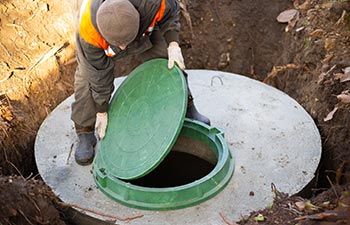
According to the EPA, as much as a quarter of Americans use a septic system to remove wastewater from their homes. It can be an efficient, safe and effective plumbing system if it is properly cared for and maintained.
Each septic system contains a drain pipe that takes wastewater away from the house and into an underground tank. In the septic tank, the solids fall to the bottom while water is allowed to exit into a drain field, where it penetrates down through the ground. The soil then takes over a natural filtration system, separating the harmful bacteria out before the water reaches the water table below. Your septic system may also use additives, which helps break down the solids.
Your septic system needs to be cared for in order to provide safe function for your family and your environment. Here are three tips to keep your septic tank healthy:
- Schedule Maintenance & Inspection: Every septic system needs regular maintenance. The frequency of your scheduled maintenance will depend on the size of your tank and the number of occupants in your household. Most systems, however, should be professionally inspected and maintained every 3 to 5 years. This appointment will check your septic tank for leaks, clogs and other malfunctions that could lead to a septic backup. A professional will also determine whether or not your septic tank needs to be pumped.
- Practice Good Septic Hygiene: Be diligent in the rules of flushing when it comes to your septic system. Avoid anything else besides water and toilet paper. Otherwise, you may end up with a clogged drain line. Be sure to avoid washing chemicals down the drain as well, as this can disrupt the natural breakdown of materials in your tank and harm the environment when it gets flushed into your drain field. It is also a good idea to ask a professional about the use of a garbage disposal if you have a septic tank.
- Conserve Water: To maximize your septic system function, try to minimize the amount of water you use. Consider things like repairing leaks, installing low-flow faucets and using only one water-reliant appliance at a time if possible.
Following the above steps never guarantees a problem-free septic tank, but it can certainly increase your chances of a healthy and smooth running plumbing system. Always be on the lookout for signs of a septic tank failure or backup such as a foul odor in your home or standing water near your drain field. Metro Septic is proud to serve customers with a full range of septic services, including preventative services as well as repair services. Call us today for more tips on protecting your septic tank.

